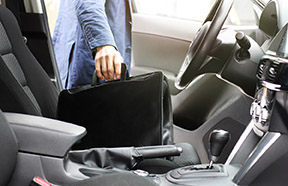

Five Exceptions to The Going and Coming Rule
It's not always easy to determine whether workers' compensation rules apply to job related travel and the rules vary from state to state.
The "going and coming" rule is not found in any Labor code. It is a case law rule that has developed over the years that says that workers' compensation benefits do not apply to injuries sustained while commuting to or from work.
But isn't driving to work coming and going? While you might think you could argue that commuting to work is job-related, the going and coming rule has traditionally ruled against that interpretation.
However, there are a few exceptions to the going and coming rule:
Commuting in a Company Car
Of course, someone driving their own car is exempt by the going and coming rule. But what if it's a company car? In most states, this is covered as workers compensation.
Driving a personal car to work is exempted by the going and coming rule. But commuting in a company-owned vehicle is often covered (in most states). In some states, the worker needs to be commuting to and from a fixed location. But other states define this more broadly. For example, if the car has a company logo on it, it might be argued that it is always being used for work-related activity, since it's essentially a moving advertisement.
Traveling as Significant Part of the Job
If travel is just part of the normal job duties, then that person is basically always at the work site and in fact, they travel in and with it. This description fits pilots, truck drivers, bus drivers, state troopers, etc. As long as the injury occurred in the course of major job duties, as opposed to driving a personal car to the station for the worker's shift as a bus driver, it would be covered.
Traveling Between Multiple Job Sites
Using a personal vehicle to go to different job sites within one shift is considered job-related usage under most state workers' comp laws. For example, consider a computer technician driving from one office building to another or the employee of a landscaping company driving to different job sites.
Commercial Traveler
According to most laws, all of the time spent away on a business trip is considered to be within the scope of employment. So even though the traveling employee attends a conference for only eight hours each day, the entire time spent traveling is considered work-related.
Special Mission
This fits those situations where a manager asks an employee to do something on their behalf. For example, if a manager gives an employee money to stop somewhere and buy coffee and donuts for the staff before work tomorrow, the employee has been asked to perform a "special mission." Even if it's completely unrelated to work, such as walking the boss’s dog, employers generally are liable for injuries related to these extra tasks.
How To Make Safety Education Fun and Effective
Five Exceptions to The Going and Coming Rule
9 Ways to Improve Your Workers' Comp Program and Save Money
When to Subrogate a Workers' Compensation Loss
The information presented and conclusions within are based upon our best judgment and analysis. It is not guaranteed information and does not necessarily reflect all available data. Web addresses are current at time of publication but subject to change. SmartsPro Marketing and The Insurance 411 do not engage in the solicitation, sale or management of securities or investments, nor does it make any recommendations on securities or investments. This material may not be quoted or reproduced in any form without publisher’s permission. All rights reserved. ©2019 Smarts Publishing. Tel. 877-762-7877. https://smartspublishing.com